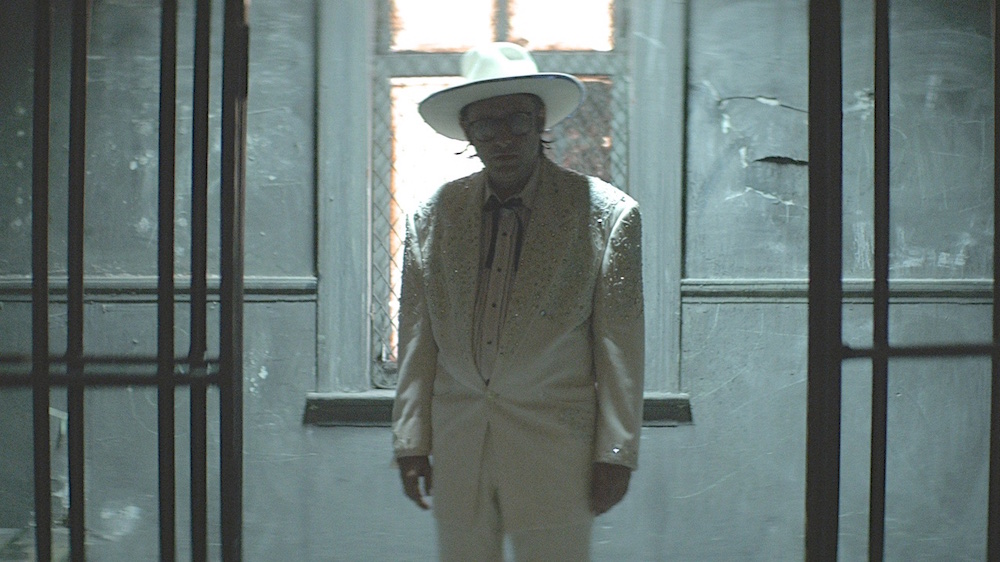
What does it feel like to not want to be well? To not just accept your suffering, but to wallow in it, to sickly come to enjoy it, to purposefully push away anyone who would bother to help your pathetic, awful life? To be so deep down the spiral of your humiliating, despairing existence that lifting a finger to get off the ground becomes more trouble than it’s worth? How far gone do you have to be before you avoid the searchlights trying to find you? Rick Alverson knows, and he wants you to know too. That’s why he made Entertainment.
Starring Gregg Turkington as a fictionalized, expanded version of his Neil Hamburger character (or a fictionalized version of himself playing his Neil Hamburger character), Entertainment resembles Alverson’s outstanding previous film The Comedy in many ways, from its anti-comedy center in their first starring dramatic role to its brutal, intense discomfort and often harrowingly disconnected main characters, and one without sympathy for Alverson’s projects might see it as a re-tread. But where The Comedy used its character study to focus on a subculture and the cultural impulses behind it- the aging hipster, so obsessed with irony that he can scarcely comprehend his own emotions anymore — Entertainment instead zeroes in on one man’s misery so completely that his loneliness becomes the point, swallowing the entire world up into one despondent, hateful, disgusting worldview, a man so bitter and exhausted that even his sweetest gestures come across as leering, off-putting, and mean.
I’m aware that so far I have probably not sold you on this movie. It sounds unpleasant, and it is. It sounds depressing, and it is. It sounds gross, cruel, and upsetting. And it is. Add to that list aimless — there is no real plot, just a following of one unnamed comedian, already at his wit’s end, unraveling even further than he previously thought possible, detouring occasionally into the mildly surreal, sometimes even taking on horror film affectations without the accompanying forward momentum. But there’s plenty of uplifting films out there, films to raise your spirits, to make you feel like the better person you always wished you could be. This one’s here, not unlike Henry: Portrait of a Serial Killer, to make you feel just terrible. Dirty. A film to bring out that stone in your stomach, the fear that in your emptiness hides something monstrous and self-destructive, a sick reassurance that rock bottom is hardly as low as you can go. I’m not going to say it’s fun — although it is engrossing and, in fits and starts, so uncomfortable that you can’t help but laugh — but it is worthwhile in its dredging of the human disease, scraping the dirt and bringing it up to the surface and demanding we familiarize ourselves.
The reason this works and doesn’t just end up a messy, nihilistic, worthless bore is Turkington himself, much the same way Tim Heidecker sold The Comedy as more than just preaching about a culture of irony and forcing us to sit with a self-centered asshole for an hour and half. Alverson as a director has a style that perfectly matches the beats of anti-comedy, twisting its heroes into something monstrous and grotesque, and he uses his actors to their fullest extent. While Turkington has less varied emotions to display than Heidecker did (after all, Heidecker’s desensitized overgrown child had ups and downs, where Turkington is an embodiment of clinical depression, all flatness and hazy, apathetic despair), his face reads just as complex, and his eventual outburst pounds your chest in its rawness and its juxtaposition to the previous hour and forty minutes of film. Turkington’s comedian character is certainly despicable, and grows more so every time he alienates the people around him, but the touches of humanity he provides give us a way in, and make him understandable, if not defensible.
Early on, his cousin, played by John C. Reilly (a standout, as always), witnesses him absolutely bomb and get heckled during a performance. Afterwards, they make awkward chit-chat, and it’s clear that the heckler upset the comedian, and he tries in his awkward way to open up to his cousin about this. He keeps talking about how this is his job, how they should have security at this dive bar, rambling on and on in a way that clearly says he just needs someone, anyone to let him talk. And then his cousin cuts him off, uncomfortable, and continues to steer the conversation towards something resembling pleasantries and normality, suggesting that although he really liked it, maybe the comedian should include less jokes about semen next time. But he really liked it. But maybe the comedian shouldn’t be so weird. But he really liked it. But maybe the comedian isn’t maximizing his profit due to poor venue choices and promotion.
Touring with the comedian is a young man named Eddie (Tye Sheridan) who does a clown act that consists, mainly, of smiling, clapping his hands, and stomping around, only occasionally using his voice to talk to the audience about how they want to fuck a clown. It’s asinine, it’s childish, it’s completely awful and unfunny, and the audience goddamn loves it, every single night, be they prisoners or dive-bar patrons. He’s embraced by the crowds because, unlike the Neil Hamburger costume the comedian puts on every night, he’s warm. He’s friendly. He’s approachable and kind and genuinely seems to want to be there. Neil Hamburger, with his meticulously applied flop-sweat, greasy comb-over, and abrasive, confrontational stage demeanor, may be “funnier”, at least to students of anti-comedy like myself, but he’s also sadder, more risible, mean, off-putting.
This makes what could’ve been a “dumb masses don’t get brilliant art” masturbatory story arc instead into, through well-observed characters and avoidance of cliché, one of the film’s most touching, powerful relationships, notably during a scene that represents the total break of the comedian from society at large. One night on stage, the comedian brutally, mercilessly, and disgustingly insults a woman who had the gall to talk during his set, unleashing misogynistic, piggish, indefensible bile at her until she leaves the crowd in tears, and then he has the gall to apologize to the audience for her, not for himself. After the set, she finds him in the empty parking lot and rips his shirt angrily, and Eddie, finding the comedian on the ground, helps him find his glasses, gives him a place to stay, helps carry the comedian into his own hotel room. It’s kind, it’s nice, it’s unconditional compassion for a man who has said nothing positive to Eddie the entire film. And the comedian, while staring off into space, tells Eddie, “Fuck you.” Coming about halfway through the film, it perfectly represents the final dive off the deep end, the sense that anything that happens next happens in the context of this man’s total destruction.
I could go on – about the comedian’s calls to his daughter, about David Yow’s house of drug addicts, about Michael Cera’s awkward bathroom talk, about the outstanding use of Spanish-language dialogue – but my point’s been made. Entertainment isn’t a fun movie, but it’s a vital one, as relevant in its main character’s own solipsism as The Comedy was in its main character’s worthless culture of callousness. Searing, precise, frightening, and often strangely beautiful, it’s a feel bad movie that you’ll want to pop in again and again, getting lost in its lonely expanses of tourist traps and endless deserts, exhausted and crawling towards an end that justifies itself as being at least a way to finish things. With Entertainment, Rick Alverson has created a haunting symphony of human degradation.
—
Directed by Rick Alverson; written by Rick Alverson, Tim Heidecker, and Gregg Turkington; starring Gregg Turkington, Tye Sheridan, Tim Heidecker, Michael Cera, and John C. Reilly; 110 minutes.
Entertainment is currently playing in limited theaters.

![Short Cuts: [REDACTED] & More](https://dimthehouselights.com/wp-content/uploads/2015/01/shortcuts-300x150.jpg)

 Derek
Derek
 Isabelle
Isabelle